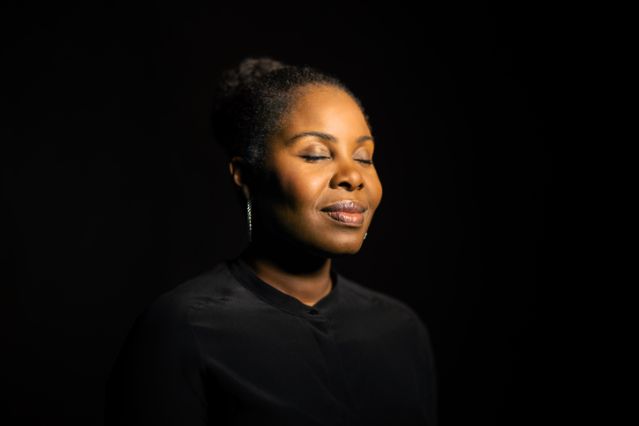Grief
Learning From Loss
Even amid heartache, you can turn an ending into the chance for a new beginning.
Posted May 9, 2024 Reviewed by Jessica Schrader
Key points
- Grief is a journey.
- You can move through grief without letting go of the memory of your loved one.
- I will focus on the “morning” phase, or the sense of hope and faith that keeps us going.

“Grief is a journey,” actor Regina King told Robin Roberts recently during a tender interview about the loss of King’s son, Ian Alexander, Jr., to suicide in 2022 at the age of 26. “I understand that grief is love that has no place to go."
Those thoughtful words beautifully captured the difficulty of dealing with loss. The interview was widely viewed and shared, in part because it was the first time the popular star had done a TV interview about losing her son. It was also notable because of the deep wisdom King expressed about moving through grief without losing her connection to her son. At the Oscars ceremony in March, she honored Ian by wearing a gown in his favorite color, orange. In the interview, she used the term "Ian-spirations" to refer to moments when she still feels his presence.
On Mother's Day, families will gather to celebrate their matriarchs or make calls to moms and bonus moms who live far away. For many, it will be a festive time. But others will experience sadness over the loss of a beloved parent. And still others, like King, who are mothers, will be reminded of a child who died too soon. If you find yourself struggling with feelings of loss, it’s OK to pause and acknowledge that as you also consider how to move through grief and move forward with your life without letting go of the memory of your loved one.
Black people are accustomed to loss. Our ancestors were ripped from their communities in Africa, creating deep wounds that have affected generations.
Black people are accustomed to loss. Our ancestors were ripped from their communities in Africa, creating deep wounds that have affected generations. During slavery, our families were often torn apart, never to see one another again. More recently, during the Great Migration, African Americans left family in the Jim Crow South to seek a better but uncertain life in the North and West.
Today, we still often face the loss of loved ones or community members to police or gun violence. Black women are at higher risk of maternal mortality and infant mortality, making even the joy of pregnancy a precarious experience for us and our families. During the COVID pandemic, which affected our families disproportionately, we suffered the loss of loved ones, jobs, homes, and security.
This history of loss has exposed us to generational trauma and the loneliness, depression, and grief that can result. For some of us, the legacy of loss can show up as constant roaming, difficulty in maintaining roots, or feeling as if we fit in. Or our feelings can harden into anger, skepticism, and an inability to be vulnerable and connect with others, which further deepens our sense of loss.
Yet as a people, we have also survived and shown remarkable resilience. Despite loss, we continue to make a way out of no way. Social work experts Elmer P. Martin and Joanne Mitchell Martin developed a framework for Black people coping with loss that describes three concepts: moaning (Black pain and grief); mourning (a collective effort to overcome grief); and morning (a new beginning).
Below, I will focus on the “morning” phase, or the sense of hope and faith that keeps us going. It’s tied to an African-centered principle celebrated during Kwanzaa—Kujichagulia, or self-determination—that is a key concept in a book that I am co-authoring about Black women and self-care in the face of racism. Consider the following practices to help you through your grief.
Moving Through Loss
Practice gratitude. Research suggests that gratitude can help us experience more positive emotions, cope with adversity, and even improve our health and relationships. A simple way to make it a routine is to create a habit of writing down three things you are grateful for every day when you wake up or before you go to bed. The practice of writing about what you’re grateful for can help you reflect on and amplify positive moments.
Connect with others. To avoid the isolation and loneliness that can come with loss, find a supportive group that can help you process your feelings. If you belong to a faith community, it might have such a group. A nonprofit called GriefShare is a resource for people seeking support with grief. Psychology Today provides a directory that includes support groups filtered by geographic location and issues, including grief. If you have a therapist, ask if they can refer you to a grief group.
Embrace movement. Whether it’s dance, a walking routine or a yoga class, make a point to move your body every day. Going on a walking date with a girlfriend, partner, or group can do wonders for your mind, body and spirit. Physical activity can help alleviate depression and grief by boosting your energy and feel-good hormones. Schedule time for movement like an appointment to ensure you do it regularly.
Seek insight into mourning. Psychologist William Worden developed a framework for mourning that involves four tasks: accepting the reality of loss; experiencing the pain and grief; adjusting to the environment without your loved one; and finding an enduring connection while you embark on a new life. Regina King’s journey is an example of the fourth task in that she is embracing her life without her son, but keeping cherished moments and memories as a source of joy and strength.
Another concept to consider is “ambiguous loss.” Coined by Pauline Boss, author of The Myth of Closure: Ambiguous Loss in a Time of Pandemic and Change, the term refers to loss that is unresolved and may be personal, communal or global. This type of loss could stem from a miscarriage, stigmatized behaviors like suicide or drug use, or loss of a relationship with a loved one because of of a condition like Alzheimer’s. In an interview, Boss explains that death is inevitable but learning to cope with loss can lead to resilience.
Turn loss into lessons. Former journalist Kimberly Seals Allers responded to the high rate of maternal mortality among Black women by developing an app called Irth, which is “birth” without the “b” for bias. It offers prenatal, birthing, postpartum and pediatric reviews of care from other Black and brown women. Seals Allers founded the digital platform after experiencing disrespect during her first pregnancy and birth. “Countless studies point to the prevalence of racism and bias in provider care,” Seals Allers has about the need for Irth. “Yet Black and brown birthing people, who are disproportionately dying during and after childbirth within the hospital medical system, have no way of knowing how someone like them experienced a doctor or provider. We deserve a public platform to share with others where we are receiving good care.”
Another resource is the documentary Aftershock, which chronicles the experience of two families who suffered the loss of relatively young mothers who died because of pregnancy complications. This powerful film sheds light on the birth justice movement and encourages action.
By practicing these ways of moving through loss, you can experience different ways of learning, healing and living, as I shared when I lost my mom in 2014. You can honor the person you lost and honor yourself with self-care.
To find a therapist, please visit the Psychology Today Therapy Directory.




